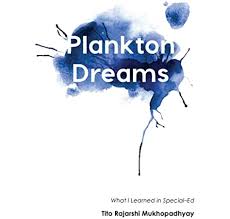Easy Read: A memoir of misfitting in special education
- Category
- News
- Date

What autism researchers might learn from reading Tito Mukhpahyay's book Plankton Dreams
More autistic people are writing their life stories. But not many critics take the stories seriously, because they show a different picture of autism from the picture they expect. They tend to see us as a collection of symptoms instead of as whole human beings who think for ourselves. Autistic writers must keep writing to get their voices heard.
Tito Mukhopadhyay is an autistic writer who is originally from India but now living in America. He does not speak. His hands tend to flap. But he started to write wonderful poetry and prose at the age of 8. His first book The Mind Tree tells what it is like to be Tito – free inside his head to think and write, but always seen as a misfit or outsider among other people. He feels his body and mind act separately, each on its own.
At school, Tito’s teachers saw only the flapping hands. They tried to teach him to control his body. Because he did not talk, they thought he would never be able to learn or study. They did not see the power of his imagination or his gift for using words. They did not realise his mother had been teaching him about the world since he was very small, and that his imagination took him inside all parts of it. Because of the way Tito’s body behaved, the teachers saw him as a misfit and not a whole person. So he calls himself ‘plankton’ – but plankton with big dreams.
Rosemarie Garland-Thomson writes about misfitting in school, work or other social groups. People label us as misfits if we look or act differently. They look at us only from the outside and see us having difficulty in certain places or groups. But we are not born as misfits. The difficulty is with the place around us or with other people’s attitude – the way they see us. If we alter the place or the attitude, we can fit in very well. For example, wheelchair ramps or better lighting can make an office easy to use for a person who cannot walk or see. Telling people our story can help them see us as whole human beings. Then we are no longer misfits.
